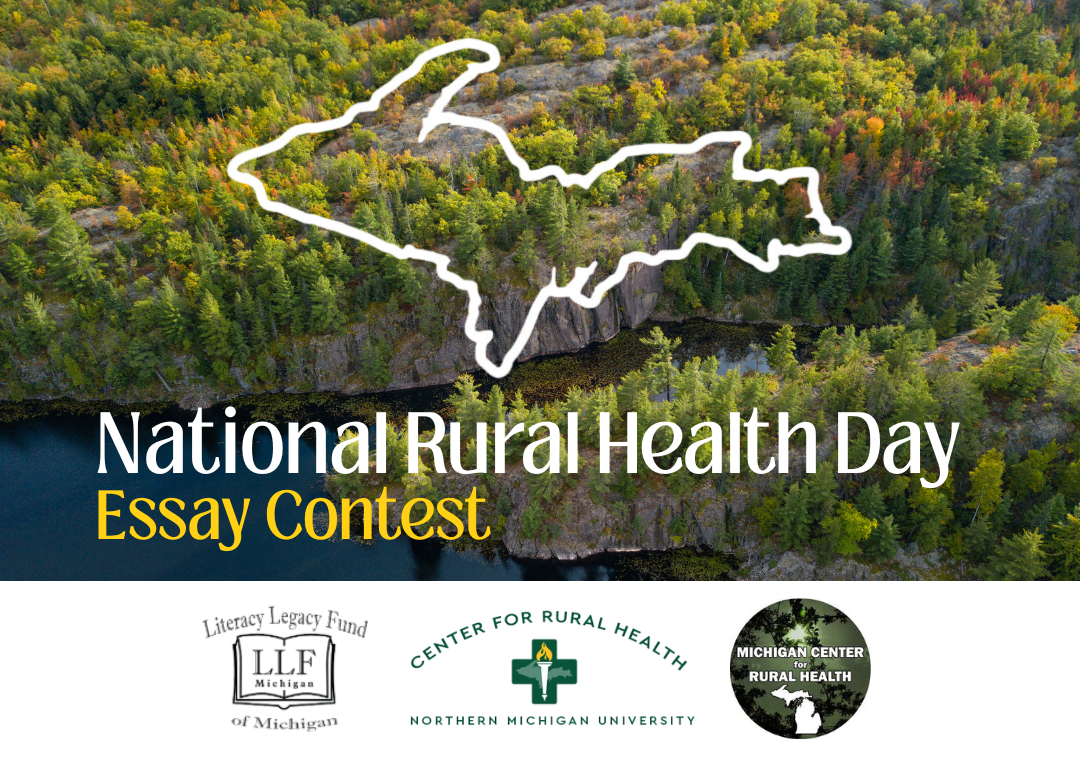About the Contest
In celebration of National Rural Health Day, recognized each year on the third Thursday of November, the Literacy Legacy Fund of Michigan, the Michigan Center for Rural Health (Michigan's State Office of Rural Health) and the Northern Michigan University Center for Rural Health partner and host the National Rural Health Day Essay Contest. The contest is open to high school seniors who reside AND attend school in the Upper Peninsula of Michigan, are college/university bound the following fall semester and intend to pursue a healthcare career in human medicine.
Essay requirements are 500 words minimum/1,000 words maximum submitted in double spaced format. Review criteria focuses on: 1) personal voice (student’s perception, insight and opinions), 2) content (issue/solution), and 3) persuasiveness.
The essay review and scoring process is overseen by NMU English Professors who work with NMU students enrolled in upper-level courses that focus on the social and rhetorical processes of composition as well as writing theories, principles and contexts with a specific emphasis on assessing and responding to written work.
NOTE: Individuals are not permitted the use of generative AI or AI-assisted tools in developing their essay for the National Rural Health Day Essay Contest. This essay is an opportunity to reflect on personal perceptions, opinions and experiences as an engagement in original thought. Submitted essays must showcase student’s own analysis and original synthesis of ideas. AI-generated responses are strictly prohibited.

Congratulations, 2025 Winners!
To read the winning essays, click on the students' respective names in the list below. These essays express the individual author's opinions and insight and may not necessarily reflect regional, accurate, statistical data.
Eastern Region Winners
1st Place: Delaney Hill, Pickford, MI
2nd Place: Ashley Dzelak, Newberry, MI
3rd Place: Ellie Emrich Rudyard, MI
Central Region Winners
1st Place: Katelyn Given, Ishpeming, MI
2nd Place: Emily Janowski, Marquette, MI
3rd Place: Abigail Pizziola, Marquette, MI
Western Region Winners
1st Place: Ayden Rau, Bessemer, MI
2nd Place: Josie Hammerstrom, Atlantic Mine, MI
3rd Place: Dalten Wagner, Stephenson, MI
Each participant wrote an essay identifying two challenges people encounter regarding preventative healthcare in their rural area of the Upper Peninsula of Michigan and then provided two solutions for overcoming these challenges.
Contest Overview
In celebration of National Rural Health Day, recognized each year on the third Thursday of November, the Literacy Legacy Fund of Michigan, the Michigan Center for Rural Health (Michigan's State Office of Rural Health) and the Northern Michigan University Center for Rural Health partner and host the National Rural Health Day Essay Contest. The contest is open to high school seniors who reside AND attend school in the Upper Peninsula of Michigan, are college/university bound the following fall semester and intend to pursue a healthcare career in human medicine.
Contest Prizes
1st, 2nd and 3rd place winners are selected in the Eastern, Central and Western regions of the Upper Peninsula. 1st place winners receive $500, 2nd place winners receive $250 and 3rd place winners receive $100. Winners are notified the third week in November and typically receive their prize in mid-December.
The deadline to enter is typically late October.
Winners are announced on National Rural Health Day.
Sponsors
A special thank you to the agencies sponsoring this essay contest.
Their generous contributions allow this opportunity to be extended to multiple regions throughout the U.P.:
Essay Prompt
Each year the essay prompt varies, yet focuses on an aspect of rural health. The essay prompt is designed to encourage students aspiring to become healthcare professionals to think deeply about the impact they can make in the future. This forward-looking perspective transforms student education from a mere accumulation of knowledge into a focused, purpose-driven mission.
Project Value
The value and importance of this project is multi-faceted because it:
- Taps into the minds of our region’s future healthcare workforce;
- Shares youth insight and perspective with healthcare industry leaders;
- Provides future educators hands-on literacy assessment experience;
- Expands and enhances interdisciplinary collaboration at NMU;
- Educates the public at large about rural health;
- Demonstrates a unified partnership between multiple organizations committed to strengthening and expanding experiences.
The Importance of Future Impact Thinking
Key Areas of Importance
Considering future impact is important because it shapes a student's development in several critical areas:
Enhancing Clinical Practice and Outcomes
- Proactive Problem Solving: Students start identifying gaps in current care models, leading them to pursue research, specialize in high-need areas, or advocate for better policies and/or protocols.
- Holistic View: Students learn to see patients not just as a set of symptoms, but as an individual within a community. The communities where patients live, work and play profoundly impacts their well-being.
Fostering Innovation and Leadership
- System Improvement: Thinking about impact involves questioning the status quo. Future healthcare professionals recognize that their role extends beyond direct care to include improving the system through quality improvement initiatives, adopting new technology and advocating for policy changes.
- Leadership Development: This perspective naturally cultivates leadership qualities, as students recognize their responsibility to mentor individuals, guide teams and drive positive change in the health care industry.
Promoting Health Equity and Justice
- Addressing Disparities: A crucial element of future impact is recognizing and committing to reducing health inequities. Students who think about this at a younger age are more likely to pursue careers or community work that focuses on vulnerable, underserved and/or marginalized populations.
- Advocacy: Students become more aware of how they can use their professional voice to advocate for health equity and justice when it comes to access to care.
Students transition from being passive learners to active agents of change when they reflect on how they may potentially contribute to the complex and evolving healthcare industry.
Core Values: Driving Purpose and Motivation
Thinking about future impact provides a powerful sense of purpose that fuels students’ motivation throughout the demanding journey of healthcare education.
Sustained Commitment: When students connect grueling hours of study and training to tangible benefits for patients and communities, they are better equipped to persevere through challenges like difficult coursework, clinical burnout, and ethical dilemmas.
Focus on Patient Needs: This mindset shifts the focus from achieving personal success (grades, prestige) to serving patient needs, which is the fundamental core of any healthcare profession. It fosters an empathetic and patient-centric approach.
Past Contest Winners
2024 Winners
To read the winning essays, click on the students' respective names in the list below. These essays express the individual author's opinions and insight and may not necessarily reflect regional, accurate, statistical data.
Eastern Region Winners
1st Place: Elizabeth Laitinen, Barbeau, MI
2nd Place: Alyssa Wojnaroski, Sault Ste. Marie, MI
3rd Place: Madison Stefanski, St. Ignace, MI
Central Region Winners
1st Place: Samantha Korpi, Gladstone, MI
2nd Place: Vy Nguyen, Escanaba, MI
3rd Place: Julia Moyle, Marquette, MI
Western Region Winners
1st Place: Keona Sutinen, Hubbell, MI
2nd Place: Emma Dube, Norway, MI
3rd Place: Maleah Maki, Ironwood, MI
Each participant wrote an essay identifying three ways they believe healthcare professionals can address health literacy.
2023 Winners
To read the winning essays, click on the students' respective names in the list below. These essays express the individual author's opinions and insight and may not necessarily reflect regional, accurate, statistical data.
Eastern Region Winners
1st Place: Christian Garrett, Sault Ste, Marie, MI
2nd Place: Jenna McDonald, Kincheloe, MI
3rd Place: Tamara Nadeau, Manistique, MI
Central Region Winners
1st Place: Lola Korpi, Ishpeming, MI
2nd Place: Amelia Helms-Gleason, Negaunee, MI
3rd Place: Maddyson Jacobson, Negaunee, MI
Western Region Winners
1st Place: Madeline Boehmer, Iron Mountain, MI
2nd Place: Emily Kilpela, Hancock, MI
3rd Place: Robin Kisiel, Chassell, MI
Each participant wrote an essay identifying one change they would advocate for in the healthcare industry and why.
2022 Winners
To read the winning essays, click on the students' respective names in the list below. These essays express the individual author's opinions and insight and may not necessarily reflect regional, accurate, statistical data.
Eastern Region Winners
1st Place: Kiarie Williams, Sault Ste Marie, MI
2nd Place: Morgan Brow, Sault Ste Marie, MI
3rd Place: Nevaeh Haines, Pickford, MI
Central Region Winners
1st Place: Madison Couillard, Rapid River, MI
2nd Place: Hannah Ruuska, Marquette, MI
3rd Place: Megan Dausey, Rapid River, MI
Western Region Winners
1st Place: Meghan Hemmer, Houghton , MI
Each participant wrote an essay identifying two ways that college and university students can contribute to efforts in any of the five key areas of social determinants of health.
2021 Winners
To read the winning essays, click on the students' respective names in the list below. These essays express the individual author's opinions and insight and may not necessarily reflect regional, accurate, statistical data.
Eastern Region Winners
1st Place: Kylie Goodman, Rudyard, MI
2nd Place: Addie Berg, Sault Ste Marie, MI
3rd Place: Siersha Miller, Brimley, MI
Central Region Winners
1st Place: Olivia Bohl, Marquette, MI
2nd Place: Abigail Racine, Ishpeming, MI
3rd Place: Aiden Swanson, Marquette, MI
Western Region Winners
1st Place: Madison Myhren, Ontonagon, MI
2nd Place: Miranda Juntunen, Chassell, MI
3rd Place: Makayla Johnson, Baraga, MI
Each participant wrote an essay identifying challenges to the Emergency Medical Services industry in their rural region of the Upper Peninsula.
Congratulations 2020 Winners!
We received over 40 entries into the 2020 National Rural Health Day Essay contest from across the Upper Peninsula. We are thrilled to share this year's winners. To read their winning essays, click on the students' respective names in the list below. These essays express the individual author's opinions and insight and may not necessarily reflect regional, accurate, statistical data.
Eastern Region Winners
1st Place: Kaylin Burton
2nd Place: Joseph Erbetta
3rd Place: Catherine Roelant
Central Region Winners
1st Place: Abbey Leinonen
Second Place: Madison Balko
3rd Place: Kiana Schuettpelz-Cornelius
Each participant wrote an essay identifying two challenges people encounter when it comes to preventative health care in their rural region of the Upper Peninsula and then explained two solutions for overcoming these challenges.
